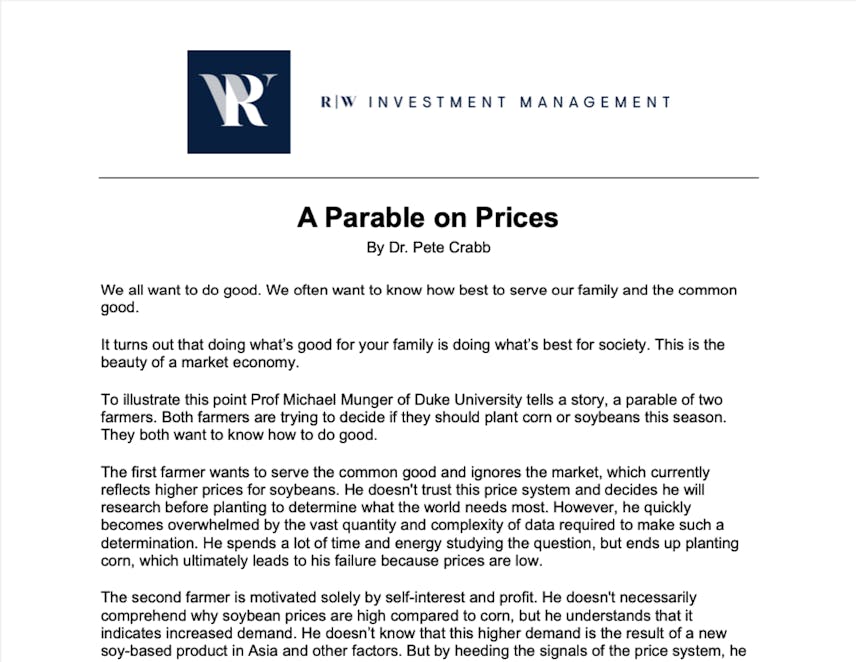We all want to do good. We often want to know how best to serve our family and the common good.
It turns out that doing what’s good for your family is doing what’s best for society. This is the beauty of a market economy.
To illustrate this point Prof Michael Munger of Duke University tells a story, a parable of two farmers. Both farmers are trying to decide if they should plant corn or soybeans this season.They both want to know how to do good.
The first farmer wants to serve the common good and ignores the market, which currently reflects higher prices for soybeans. He doesn't trust this price system and decides he will research before planting to determine what the world needs most. However, he quickly becomes overwhelmed by the vast quantity and complexity of data required to make such a determination. He spends a lot of time and energy studying the question, but ends up planting corn, which ultimately leads to his failure because prices are low.
The second farmer is motivated solely by self-interest and profit. He doesn't necessarily comprehend why soybean prices are high compared to corn, but he understands that it indicates increased demand. He doesn’t know that this higher demand is the result of a new soy-based product in Asia and other factors. But by heeding the signals of the price system, he produces precisely what the world requires most, aligning his self-interest with the broader needs of society.
The moral of the parable is simple: prices in a market economy serve as a valuable guide. Prices effectively direct resources towards the most pressing demands, optimizing resource allocation for the greater good.
Doing right for yourself is doing right for society. Why is this so?
Market prices align self-interest with the broader needs of society through a mechanism known as the "invisible hand," a concept popularized by Adam Smith in his seminal work, The Wealth of Nations. In a market economy people act in their own self-interest. While working and producing they aim to maximize wages or profits. At the same time, in their consumption choices people seek to maximize their utility or satisfaction by obtaining goods and services they desire.
When a particular product or service is in high demand relative to its supply, its price will rise.Conversely, when supply outstrips demand, prices tend to fall. Higher prices signal to everyone that there is an opportunity for profit in supplying more of a certain product or labor service. In pursuit of better wages or profits, people allocate resources, invest in production, and innovate to meet the demand for goods and services that others value.
Smith's "invisible hand" concept demonstrates that individuals pursuing their self-interest,guided by price signals, unintentionally contribute to the overall well-being of society. By producing what consumers want at prices they are willing to pay, business owners and employees indirectly serve the broader needs and desires of society.
The price system aligns self-interest with the broader needs of society by harnessing individual motivations. It encourages each one of us, as both a producer and consumer, to act efficiently, resulting in a dynamic and responsive economic system that benefits society as a whole.
The knowledge that the first farmer wanted in order to make the planting decision simply wasn’t available. In society knowledge is too specific, too dispersed, and too costly to collect. Knowledge about various products, services, and industries can be incredibly detailed and specific. This specificity means that to have a comprehensive understanding of all aspects of production and consumption would require an immense amount of information. It's impractical for any single individual or entity to possess such a level of detail about every aspect of the economy.
Furthermore, knowledge in an economy is never centralized; it is dispersed across countless individuals, firms, and organizations. Each entity has its own unique information about its operations, customers, and market conditions. This dispersion makes it challenging to aggregate and access all the relevant knowledge necessary to make optimal economic decisions.
Because knowledge is specific and disbursed, collecting, processing, and maintaining it is prohibitively costly. Gathering comprehensive data on every economic transaction, supply chain, and consumer preference would require significant resources, both in terms of time and money. These costs may outweigh the potential benefits.
All this underscores the limitations of government planning and the advantages of the market economy. Prices act as a decentralized mechanism that efficiently conveys information about supply, demand, and relative scarcity without requiring the collection of all the specific,dispersed, and costly knowledge. Market prices are the only signal people need to guide their economic decisions.
To do good, listen to the market. Trust market prices.
Sources: Learn Liberty EconClips, 2013, The Price System: Information and Coordination https://www.youtube.com/watch?v=WPy-QKXofQs
RW Investment Management, LLC dba RW Investment Management (“RWIM”) is a Registered InvestmentAdviser. This document is solely for informational purposes. Advisory services are only offered to clients or prospective clients where RWIM and its representatives are properly licensed or exempt from licensure.Past performance is no guarantee of future returns. Investing involves risk and possible loss of principal capital. No advice may be rendered by RWIM unless a client service agreement is in place. RWIM is not a legal or tax advisor.
Accessibility Statement
This website is run by R|W Investment Management. We strive to make our website as accessible as possible. If you would like to receive this content in a different way, please contact us toll-free at (844) 834-7500.
